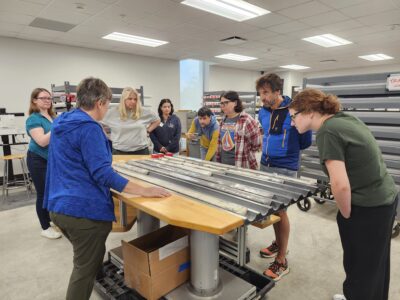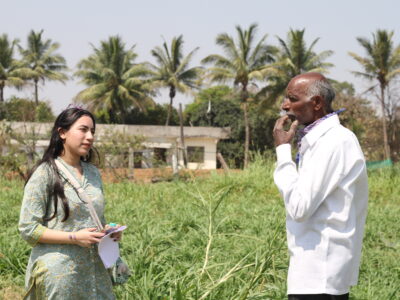
Students enrolled in the Sustainability Management program’s newly developed courses will learn the most innovative solutions to the sustainability challenges faced by the world’s rapidly growing urban centers, from issues of land use and biodiversity to congestion management and climate adaptation policies. These courses will taught by expert practitioner instructors, Amy Karpati and Jitendra Bajpai.
The MS in Sustainability Management, co-sponsored by the Earth Institute and Columbia’s School of Continuing Education, trains students to tackle complex and pressing environmental and managerial challenges. The M.S.in Sustainability Management program requires the successful completion of 36 credit points. Those credit points are divided among five comprehensive content areas: integrative sustainability management, economics and quantitative analysis, the physical dimensions of sustainability, the public policy environment of sustainability management, and general and financial management. The Science of Urban Ecology and Sustainable Cities both satisfy the programs the physical dimensions of sustainability course requirements.
The Science of Urban Ecology, taught by Amy Karpati
Dr. Amy Karpati teaches the brand new Science of Urban Ecology course. Karpati is the director of Conservation Science at Pinelands Preservation Alliance in the Pine Barrens of New Jersey. She has worked previously with the Center for Urban Restoration Ecology and has focused her research on such urban ecology issues as plant community restoration and urbanization impacts on soil biota.
Her newly developed course, The Science of Urban Ecology, focuses on the basic principles related to ecological interactions of life on earth, the causes and consequence of changes in biological diversity, and how ecology can inform land use decisions and applied management strategies of natural resources particularly in urban environments. Karpati says that The Science of Urban Ecology course is necessary for sustainability managers because, “Ecological interactions govern patterns and processes of life on Earth, from biodiversity and species coexistence to nutrient cycling and resource availability. Because people are not separate from their natural environment, it is essential to recognize that cities are not exempt from ecological patterns and processes. An understanding of how the urban ecosystem functions biologically is critical for sustainability managers to see the ‘big picture’, and to integrate this understanding of urban ecology with studies of economics and sociology to truly achieve sustainability goals.”
In this course, Students will acquire an understanding of the ecology of natural spaces in human-dominated landscapes, the theory and study of urban ecology, and the skills necessary to assess the health and sustainability of urban communities. Students will also explore timely and important urban ecology issues including ecological restoration, invasive species, and biodiversity conservation.
Sustainable Cities, taught by Jit Bajpai
Dr. Jit Bajpai teaches the newly developed Sustainable Cities course. He is a former director at the World Bank where he led the corporate level operations and knowledge systems services, managed East Asia and Pacific Region’s operations in the transport sector and served as an advisor to the regional Vice-President. Prior to the World Bank, he worked with COMSIS, the Technology Research and Analysis Corporation, and as an assistant professor at the Indian Institute of Technology, Bombay.
Bajpai’s course, Sustainable Cities, will provide an integrative framework to address the sustainability issues being faced by the urban centers of developed and developing world, their decision-makers and inhabitants. Bajpai says, “Since the majority of humanity lives in cities, they are rapidly increasing cities control critical levers for global sustainability. The students of sustainable cities course will have the opportunity to join an important community of thinkers, experts and leaders who strive to shape a sustainable urban future.”
As urban population growth continues, urban centers face the problems of aging infrastructure, economic growth, changing climate, congestion, pollution, and demands of inhabitants to enhance their quality of life. In response many cities are striving to be low carbon city while sustaining healthy economic and social life. But addressing the new urban agenda requires a new model of cooperation across sectors and all tiers of government to redirect the urban economic development into paths that are restorative. To offer practical insight into critical urban issues, students will review case studies and related background material covering the key city level sector activities.



